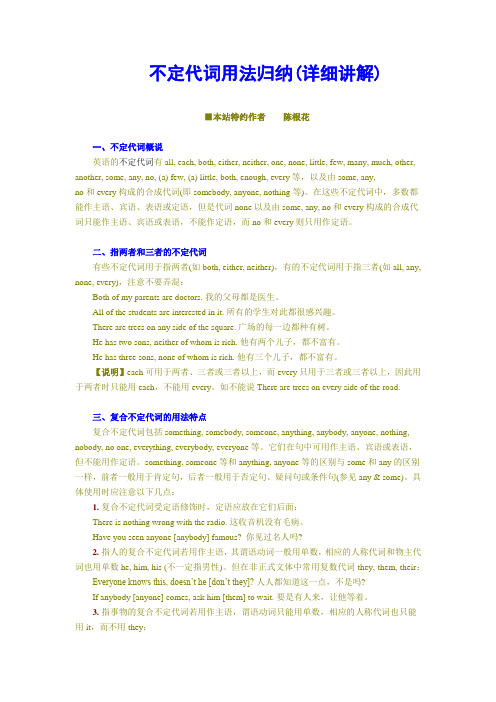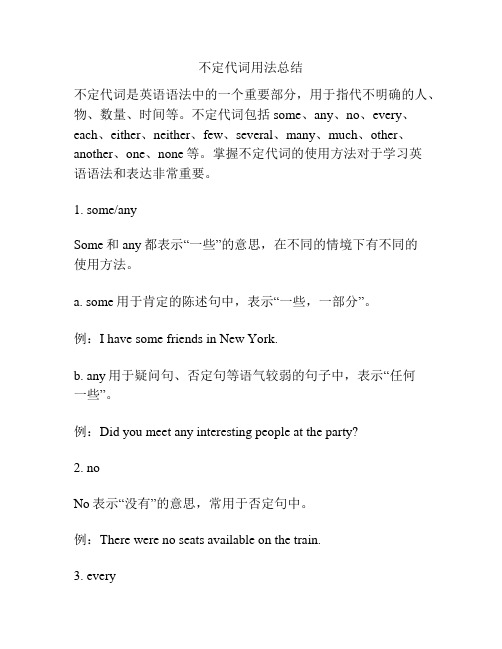不定代词用法总结
不定代词用法总结

不定代词用法总结-标准化文件发布号:(9556-EUATWK-MWUB-WUNN-INNUL-DDQTY-KII不定代词用法总结1) some, any, no的用法a. some和any通常用于表示不定数或不定量,修饰复数可数名词或不可数名词。
some表示“几个;一些;部分”,多用于肯定句;而any表示“一些;什么;任何;”,对用于否定句或疑问句中。
如:* He asked me some questions. (他问了我几个问题。
) * Some of the bread has been eaten. (面包已吃了一些。
) * Are there any stamps in this post office(这个邮局里有邮票吗?)* I didn’t have any cigarettes, so I went out to buy some. (我没有香烟了,所以出去买了一些。
)b. 刚才我们说some一般用于肯定句而any一般用于否定句和疑问句。
但有时也有例外。
这要根据句子意思来看。
* I could not answer some of his questions. (我不能回答他的某些问题。
)(some用在否定句中表示“一些;部分”。
如果说成:I could not answer any of his questions.意思就变了,它表示“我不能回答他的任何问题。
”)* Will you get me some apples on your way back (你回来的路上能给我带一些苹果吗?)(some用在疑问句中大多表示“请求” 或“建议”)* Let me know if you hear any news. (如果你有任何消息请告诉我。
) (any用在条件从句中表示“任何”)* “What would you like to drink”“Any will do.” (“你想喝什么?”“哪种都行。
不定代词用法总结

不定代词用法总结1)some,any,no的用法a。
some和any通常用于表示不定数或不定量,修饰复数可数名词或不可数名词。
some表示“几个;一些;部分”,多用于肯定句;而any表示“一些;什么;任何;”,对用于否定句或疑问句中.如:*He asked me some questions。
(他问了我几个问题。
)*Some of the bread has been eaten。
(面包已吃了一些。
)*Are there any stamps in this post office? (这个邮局里有邮票吗?)*I didn’t have any cigarettes, so I went out to buy some。
(我没有香烟了,所以出去买了一些。
)b. 刚才我们说some一般用于肯定句而any一般用于否定句和疑问句。
但有时也有例外。
这要根据句子意思来看。
* I could not answer some of his questions. (我不能回答他的某些问题.)(some用在否定句中表示“一些;部分”.如果说成:I could not answer any of his questions.意思就变了,它表示“我不能回答他的任何问题。
”)*Will you get me some apples on your way back?(你回来的路上能给我带一些苹果吗?)(some用在疑问句中大多表示“请求” 或“建议")*Let me know if you hear any news. (如果你有任何消息请告诉我。
) (any用在条件从句中表示“任何")* “What would you like t o drink?” “Any will do.” (“你想喝什么?”“哪种都行。
”) (any在这里表示“任何”)c. no在句子中作定语,表示否定,意思是“没有;不是”,它可以修饰可数名词的单数和复数形式或不可数名词.* There are no letters for you today. (今天没有你的信。
不定代词用法总结

不定代词:代替或修饰不特指的人或事物的代词叫不定代词.any用于肯定句时,意思是“任何的”。
Come here with any friend.(随便带什么朋友来吧。
)no和none的用法:no是形容词,只能作定语表示,意思是“没有”,修饰可数名词(单数或复数)或不可数名词.如:There is no time left。
Please hurry up.(没有时间了,请快点)/ They had no reading books to lend.(他们没有阅读用书可以出借)none只能独立使用,在句子中可作主语、宾语和表语,意思是“没有一个人(或事物)”,表示复数或单数。
如:None of them is/are in the classroom。
(他们当中没有一个在教室里)/ I have many books,but none is interesting.(我有很多的书,但没有一本是有趣的)either和neither的用法:either意思是“两个中间的任何一个”;neither是either的否定形式,意思是“两个都不"。
neither和either在句子中可作主语、宾语和定语等,都用作单数。
如:I don't care much for what to drink。
Either of the two will do。
(我不介意喝些什么,两个之中随便哪个都行)/ —-Will yougo there by bus or by car? –Neither. I will go there by train。
(你坐公车去还是坐轿车去?一个都不坐,我坐火车去。
)other、the other和another的用法:other意思是“另一"、“另一些”,有复数形式。
在句子中可作主语、宾语和定语。
another意思是“另外”、“又一个”,表示增加,在句中可作宾语和定语.如:Some girls are singing under the big apple tree and others are sitting on the grass talking。
(完整版)不定代词用法归纳

不定代词用法归纳(详细讲解)■本站特约作者陈根花一、不定代词概说英语的不定代词有 all, each, both, either, neither, one, none, little, few, many, much, other, another, some, any, no, (a) few, (a) little, both, enough, every 等,以及由 some, any,no 和 every 构成的合成代词(即somebody, anyone, nothing 等)。
在这些不定代词中,多数都能作主语、宾语、表语或定语,但是代词 none 以及由 some, any, no 和 every 构成的合成代词只能作主语、宾语或表语,不能作定语,而 no 和 every 则只用作定语。
二、指两者和三者的不定代词有些不定代词用于指两者(如both, either, neither),有的不定代词用于指三者(如all, any, none, every),注意不要弄混:Both of my parents are doctors. 我的父母都是医生。
All of the students are interested in it. 所有的学生对此都很感兴趣。
There are trees on any side of the square. 广场的每一边都种有树。
He has two sons, neither of whom is rich. 他有两个儿子,都不富有。
He has three sons, none of whom is rich. 他有三个儿子,都不富有。
【说明】each 可用于两者、三者或三者以上,而 every 只用于三者或三者以上,因此用于两者时只能用 each,不能用 every。
如不能说 There are trees on every side of the road.三、复合不定代词的用法特点复合不定代词包括 something, somebody, someone, anything, anybody, anyone, nothing, nobody, no one, everything, everybody, everyone 等。
不定代词用法总结

不定代词用法总结不定代词是在句子中代替特定人或物的词语,它们的使用能够让句子更加简洁明了。
下面是对不定代词的用法做一个总结。
1. 一般不定代词一般不定代词包括"something"、"anything"、"nothing"、"everything"等,它们用来代替不具体指向的事物。
例如:- I have something to tell you.- Is there anything I can do for you?- Don't worry, it's nothing serious.- She knows everything about that topic.2. 不定代词"some"和"any""some"和"any"可以用作不定代词,也可以用作不定代词,具体使用要根据句子的语境来确定。
当"some"用作不定代词时,表示肯定或推测的意思。
例如:- There are some books on the table.- Can I have some water, please?当"any"用作不定代词时,表示否定或疑问的意思。
- I don't have any money with me.- Do you have any ideas for the project?3. 不定代词"somebody"、"anybody"、"nobody"和"everybody"这些不定代词用来代替人。
它们的使用方式类似于前面提到的一般不定代词。
例如:- Somebody is waiting for you outside.- Nobody knows the answer.- Can anybody help me with this problem?- Everybody enjoyed the party.4. 不定代词"each"和"every""each"和"every"用来代替三者或多者中的每一个。
不定代词用法总结

不定代词用法总结不定代词是英语语法中的一个重要部分,用于指代不明确的人、物、数量、时间等。
不定代词包括some、any、no、every、each、either、neither、few、several、many、much、other、another、one、none等。
掌握不定代词的使用方法对于学习英语语法和表达非常重要。
1. some/anySome和any都表示“一些”的意思,在不同的情境下有不同的使用方法。
a. some用于肯定的陈述句中,表示“一些,一部分”。
例:I have some friends in New York.b. any用于疑问句、否定句等语气较弱的句子中,表示“任何一些”。
例:Did you meet any interesting people at the party?2. noNo表示“没有”的意思,常用于否定句中。
例:There were no seats available on the train.3. everyEvery表示“每一个”的意思。
例:Every student is required to attend the meeting.4. eachEach表示“每一个”,用于强调个体。
例:Each student is responsible for his or her own progress.5. either/neitherEither表示“两者中的任何一个”,neither表示“两者都不”。
例:You can choose either the blue or the red dress.例:Neither of us likes to cook.6. few/several/many/much这些代词都用于表示数量或程度。
a. few表示“很少,几乎没有”。
例:There were few people in the park on such a hot day.b. several表示“几个,若干”。
不定代词的用法归纳
不定代词的用法归纳不定代词是指在句子中表示不确定或不特指人或物的代词,如:一些、任何、一切等。
不定代词在汉语语法中起着非常重要的作用,它们有着丰富的用法和变化。
下面将通过归纳和举例的方式,总结不定代词的用法和特点,希望可以帮助您更好地理解和掌握不定代词的用法。
一、不定代词的种类不定代词包括数量不定代词、疑问不定代词和不定代词短语三种类型。
1. 数量不定代词数量不定代词指示数量不确定的事物,如:- 一些:表示数量不多或不确定的事物,如“我看到了一些书。
”- 多少:用于疑问句中,表示数量或程度,如“你有多少钱?”- 若干:表示数量较多但不确定具体数量的事物,如“他买了若干本书。
”- 一点:表示数量不多的事物,如“我有一点时间。
”- 等等:表示列举事物中的一部分,如“这里有苹果、梨子等等。
”2. 疑问不定代词疑问不定代词用于疑问句中,用来问及数量、程度、方式等,如:- 何等:表示程度或方式,如“她的表演何等出色!”- 何事:表示具体事情,如“他们在讨论着何事?”- 几何:表示数量或程度,如“这支队伍有几何人?”- 如何:表示方式或程度,如“你如何看待这个问题?”- 何人:表示具体人,如“来访的是何人?”- 何处:表示具体地点,如“他们在何处聚会?”- 何以:表示方法或原因,如“我们何以解决这个问题?”- 何以故:表示原因,如“他们离开的何以故?”3. 不定代词短语不定代词短语是由一个或多个词组成的不定代词,如:- 有的(少数):表示有一部分事物,如“有的学生不喜欢数学。
”- 无论(不分别):表示两者都一样,如“无论贫富,人生都应该平等。
” - 也许(或许):表示可能性,如“也许他今天会来。
”- 可能(或许):表示可能性,如“他可能迟到了。
”- 不论(无论):表示两者都一样,如“不论去哪里,我都会支持你。
”二、不定代词的用法1. 作主语不定代词可以作为句子的主语来表示不定的人或物,如:- 任何人都可以报名参加。
不定代词用法归纳
不定代词用法归纳一、不定代词概说英语的不定代词有 all, each, both, either, neither, one, none, little, few, many, much,other, another, some, any, no, (a) few, (a) little, both, enough, every 等,以及由 some, a ny, no 和 every 构成的合成代词(即 somebody, anyone, nothing 等)。
在这些不定代词中,多数都能作主语、宾语、表语或定语,但是代词 none 以及由 some, any, no 和 every 构成的合成代词只能作主语、宾语或表语,不能作定语,而 no 和 every 则只用作定语。
二、指两者和三者的不定代词有些不定代词用于指两者(如 both, either, neither),有的不定代词用于指三者 (如 all, an y, none, every) ,注意不要弄混:Both of my parents are doctors. 我的父母都是医生。
All of the students are interested in it. 所有的学生对此都很感兴趣。
There are trees on any side of the square. 广场的每一边都种有树。
He has two sons, neither of whom is rich. 他有两个儿子,都不富有。
He has three sons, none of whom is rich. 他有三个儿子,都不富有。
【说明】each 可用于两者、三者或三者以上,而 every 只用于三者或三者以上,因此用于两者时只能用 each,不能用 every 。
如不能说 There are trees on every side of the ro ad.三、复合不定代词的用法特点复合不定代词包括 something, somebody, someone, anything, anybody, anyone, nothin g, nobody, no one, everything, everybody, everyone 等。
完整版)不定代词用法总结
完整版)不定代词用法总结不定代词的用法一、不定代词some和any的用法区别一般来说,some用于肯定句中,而any用于否定句和疑问句中。
但是,在表示请求、邀请或征求意见的句子中,通常要用some而不用any,例如:Would you like some cake。
你想吃点蛋糕吗?Why not buy some bread。
为什么不买些面包呢?Shall I get some chalk for you。
要我帮你拿些粉笔来吗?需要说明的是,有时候any也用于肯定句中,此时表示“任何”,例如:Any colour will do。
任何颜色都可以。
Come any day you like。
你随便哪天来都可以。
二、不定代词many和much的用法以及区别不定代词many和much都表示“许多”,但many修饰或代替可数名词(复数),与few(少数)相对;而much用来修饰或代替不可数名词(单数),与little(少量)相对。
在口语中,两者主要用于非肯定句中,例如:Did you see many people there。
你在那儿看见许多人了吗?We don’t have much time。
我们没有许多时间。
XXX work has been done。
许多工作都已经做了。
You’ve given me too much。
你给我太多了。
Take as many (much) as you want。
你要多少拿多少。
I asked her a great many ns。
我问了她许多问题。
另外需要注意的是,too much可以作副词或代词,也可以用作形容词修饰不可数名词,例如:Is watching TV too much good or bad for your health。
看电视太多对你的健康有益还是有害?You’ve given me too much。
你给我的太多了。
We’ve had too much rain lately。
不定代词的用法
不定代词的用法1. some,any(1) some多用于肯定句,修饰复数可数名词和不可数名词,作“一些”解。
它还可修饰单数可数名词,作“某一”解。
如:H-5 avian influenza first broke out in some Asian countries.H-5型禽流感首先在亚洲爆发。
Some people are early risers. 有些人起得很早。
(2) any通常用于否定句、疑问句或条件句,修饰单数或复数可数名词以及不可数名词。
If there are any new magazines in the library, take some for me.图书馆如果来了新杂志,替我借几本。
Are there any stamps in the drawer? 抽屉里有邮票吗?Is there any money with you? 你身上带钱了吗?(3) any还可以用于肯定句,作“任何的”解。
You can come here any time. 你什么时候来都行。
You can get it at any shop. 你可以在任何一家商店买到它。
2. either,both,all(1) either表示“两者中的任何一个”。
Either of the brothers is selfish. 两兄弟都非常自私。
Either will do. 两个都行。
(2) both“两个都”,修饰可数名词,统指两者。
Tom and Jack both made some progress. 汤姆和杰克两个都有所进步。
Both of them should make concessions. 他们双方都应做出让步。
(3) all“全部,所有的”,修饰可数名词和不可数名词,指两个以上的人或物。
All the students contributed to the fund.所有的学生都为基金会捐了款。
- 1、下载文档前请自行甄别文档内容的完整性,平台不提供额外的编辑、内容补充、找答案等附加服务。
- 2、"仅部分预览"的文档,不可在线预览部分如存在完整性等问题,可反馈申请退款(可完整预览的文档不适用该条件!)。
- 3、如文档侵犯您的权益,请联系客服反馈,我们会尽快为您处理(人工客服工作时间:9:00-18:30)。
不定代词总结一、不定代词some 与any的用法区别一般说来,不定代词some 用于肯定句中,any 用于否定句和疑问句中。
但是,在表示请求、邀请或征求意见的句子中,通常要用some而不用any:Would you like some cake?吃点蛋糕吗?Whynot buysome bread?为什么不买些面包呢?Shall Igetsome chalk foryou?要我帮你拿些粉笔来吗?【说明】不定代词any 有时也用于肯定句中,此时表示“任何”:Any colourwill do.任何颜色都行。
Comeany day you like. 随便哪天来都可以。
二、不定代词many 与much的用法以及区别不定代词many和much都表示“许多”,但many 修饰或代替可数名词(复数),与few(少数)相对;而much用来修饰或代替不可数名词(单数),与little(少量)相对。
在口语中两者主要用于非肯定句中:Did you see manypeople there? 你在那儿看见许多人了吗?Wedon’t have much time. 我们没有许多时间。
Much workhas been done.许多工作都已经做了。
You’ve given metoo much. 你已给我太多了。
Take asmany (much)as youwant.你要多少拿多少。
I asked heragreat manyquestions. 我问了她许多问题。
辨析:too much;muchtoo;toomany1、toomuch常用作副词或代词,也可以用作形容词修饰不可数名词.如:Is watching TV too much good orbad foryour health?电视看得太多对你的健康有益还是有害?You'vegivenme toomuch.你给我的太多了.We've hadtoo much rain lately.最近我们这里的雨下得太多了.2、much too常作副词,后接副词或形容词.如:He drovemuch too fast.他开车开得太快了.Itis much toocold.天实在太冷了.3、too many常用作形容词,修饰可数名词复数.如:Theybuilt toomany buildings lastyear.去年他们建了许多楼房.三、either、neither的用法以及区别1、用作副词。
either也(不),用于否定句中。
如:I don’t like fishing, David doesn’t like fishing,either.我不喜欢钓鱼,大卫也不喜欢。
neither也不;用于肯定句,表示否定含义。
如: He can’tswim,andneither / norcan I. 他不会游泳,我也不会。
2、用作代词。
范围多限定于两者之间,常用作主语。
either of和neitherof +名词/代词的复数,作主语时,谓语动词用单数。
either表示“二者之一”;neither 表示“两者都不”,其反义词是both。
如:Either of the knives is useful.两把刀都有用。
Neitherof them was ingood health, but bothworked very hard.他们两人身体都不好,但都努力地工作。
3、用作连词:either…or…不是……就是……neither…nor…既不……也不……常用来连接两个并列成分,如并列主语、并列谓语等。
谓语动词保持就近原则,与离它最近的主语在人称和数上保持一致。
但应注意以下几点:1.无论either…or…还是neither…nor…,若连接两个单数数名词/代词作主语,后面动词用单数。
Either Mary or Lucy is coming.不是玛丽来,就是露西来。
2.若连接两个复数名词/代词作主语,后面动词用复数。
Neithermy parents normygrandparents arecoming.我的父母不来,我的爷爷奶奶也不来。
3.如果一个单数名词/代词和一个复数名词/代词一起作主语时,动词的单复数形式必须和最靠近的一个主语保持一致。
(就近原则)Either my parentsor Lucy is coming.不是我的父母来,就是露西来。
四、all,both的用法以及区别, 两者表示“都”,“全部”。
(1) both指两个人或物,而all指三个以上的人或物,在句中都可作主语、宾语、表语、同位语或定语。
Both of uswant to go. 我们两人都想去。
Allofusshouldwork hard.我们都应努力工作。
(2)both和all都可直接修饰名词;名词前如有限定词时,其前只能用both of或all of。
Bothbrothers are clever. 兄弟俩都聪明。
Both ofthe booksareuseful.两本书都有用。
(3) both和all在句中的位置是位于be动词之后,行为动词之前,如有情态动词或助动词,则位于情态动词或助动词与主动词之间。
We are all here. 我们都来了。
五、Theother,others,the others, another它们的用法现归纳如下:1. Other可作形容词或代词,做形容词时,意思是“别的,其他”,泛指“其他的(人或物)”。
如: Do you have anyother question(s)?你还有其他问题吗? Asksome other people. 问问别人吧!Put it in your other hand. 把它放在你另一只手里。
2.The other指两个人或物中的一个时,只能用the other,不能用another,此时的other作代词。
如:He has two daughters. Oneis a nurse, the other is aworker.他有两个女儿,一个是护士,另一个是工人。
The other后可加单数名词,也可加复数名词,此时的other作形容词。
如:On theother side of thestreet,there isa tall tree. 在街道的另一边,有一棵大树。
Mary is much taller thanthe other girls.玛丽比其他的女孩高得多。
Helives on the other side ofthe river. 他住在河的对岸。
3. Others是other的复数形式,泛指“另外几个”,“其余的”。
在句中可作主语、宾语。
如: Someof uslike singing anddancing, others go infor sports.我们一些人喜欢唱歌和跳舞,其余的从事体育活动。
Givemesome others, please. 请给我别的东西吧!Thereare no others. 没有别的了。
4. The others意思是“其他东西,其余的人”。
特指某一范围内的“其他的(人或物)”。
是the other的复数形式。
如:Two boys will go to thezoo,and the others willstay at home.两个男孩将去动物园,其余的留在家里。
theothers=theother复数名词六、every和each1) every 强调全体的概念, each强调个体概念。
Every student in our school workshard. 我们学校的学生都很用功。
Eachstudent may have one book.. 每个学生都可有一本书。
2) every指三个以上的人或物(含三个),each指两个以上的人或物(含两个)。
3) every 只作形容词,不可单独使用。
each可作代词或形容词。
Every student has to takeone.Each boyhasto takeone.Eachoftheboyshasto take one.4) every与not 连用,表示部分否定;each和not连用表示全部否定。
Every man is not honest. 并非每个人都诚实。
Each man is not honest. 这儿每个人都不诚实。
七、不定代词few, a few 与little, a little的用法区别1.不定代词few和a few后接可数名词的复数形式。
few 表示数量很少或几乎没有,强调“少”,含有否定意义;a few 表示数量虽然少但毕竟还有,强调“有”,含有肯定意义:Itis very difficult, and few peopleunderstand it.它很难,没有几个人能懂。
It is very difficult,but a few people understandit. 他虽难,但是有些人懂。
2. little和a little 之后接不可数名词,其区别跟few 和a few 之间的区别相似:Unfortunately,I had little money on me. 很不巧,我身上没带什么钱。
Fortunately,Ihad a little money on me. 幸好我身上带着一点钱。
不定代词总结一、指两者和三者的不定代词有些不定代词用于指两者(如both, either, neither),有的不定代词用于指三者(如all, any,none, every),注意不要弄混:Both of myparents aredoctors.我的父母都是医生。
All of the students areinterested in it. 所有的学生对此都很感兴趣。
There are trees on any sideof the square.广场的每一边都种有树。
Hehas two sons,neither of whom is rich. 他有两个儿子,都不富有。
He has three sons, none of whom is rich.他有三个儿子,都不富有。
【说明】each可用于两者、三者或三者以上,而every 只用于三者或三者以上,因此用于两者时只能用each,不能用every。
如不能说There are trees onevery side oftheroad.二、复合不定代词的用法特点复合不定代词包括something,somebody, someone,anything, anybody,anyone,nothing, nobody,no one,everything,everybody, everyone等。
